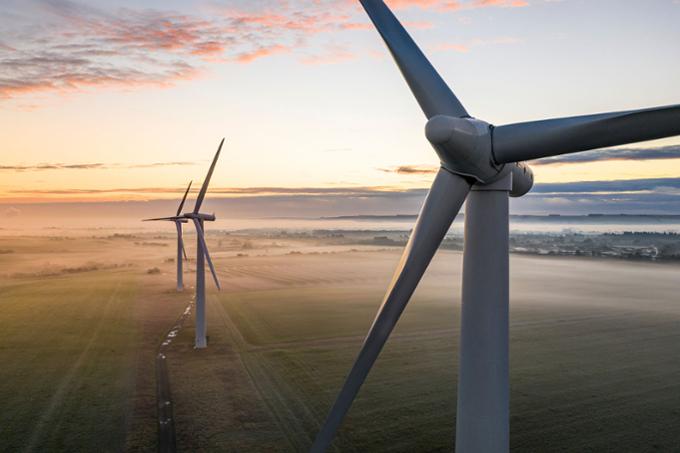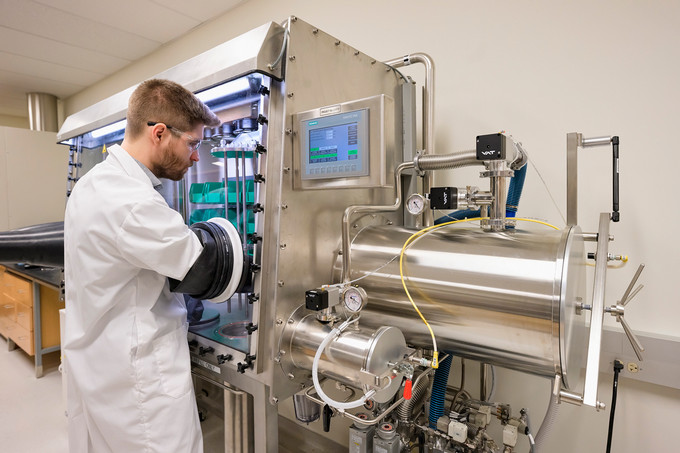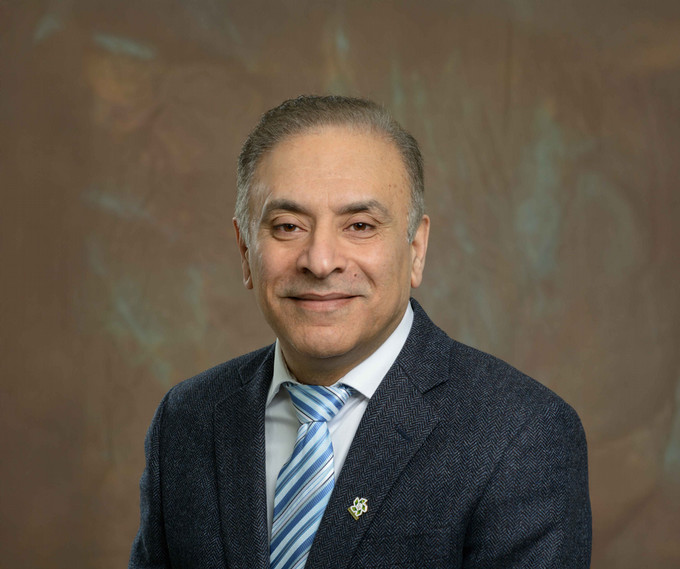Energy Systems Engineering
What is Energy Systems Engineering?
Shape your future and the future of energy in the Energy Systems Engineering (ERSE). This comprehensive undergraduate program responds to the rapidly changing energy landscape and the University of Regina’s commitment to climate action. With three options to choose from; Petroleum, Sustainable Energy and Energy Transportation and Storage; the U of R’s Energy Systems Engineering program offers you the most comprehensive energy-related curriculum available at any Canadian university.
We offer comprehensive undergraduate and graduate programs that combine academic depth with hands-on learning. Our undergraduate courses include extensive laboratory work, supported by full-time lab instructors who help students develop essential practical skills. Upper-year classes are small—typically between 10 and 30 students—allowing for a more personalized and engaging learning environment. Students also benefit from co-operative education and internship opportunities that provide valuable real-world experience. Graduate students in MEng, MASc, and PhD programs benefit from access to cutting-edge research facilities, empowering them to drive innovation and make meaningful contributions in their fields.

Key research areas include:
Petroleum Focused
- Enhanced Oil Recovery (EOR) and Carbon Storage
Advancements in CO₂-based EOR, solvent vapor extraction (VAPEX), and chemical EOR methods for heavy and tight oil reservoirs.
- Enhanced Oil Recovery (EOR)
Advancements in CO2-based EOR, Cyclic Solvent Injection, and chemical EOR methods. Understanding the physics of multiple-phase flow in unconventional petroleum systems (heavy/extra-heavy oil, shale oil, shale gas, etc.) - CO2 geological storage
Advancing the understanding and better modelling (both experimental and mathematical) of CO2, formation fluids, and formation rocks interactions and the Synergies of CO₂–EOR and Storage.
- Enhanced Oil Recovery (EOR)
- Reservoir Characterization and Simulation
Development of high-performance reservoir simulation tools, transient pressure analysis, and modeling of multiphase flow in heterogeneous porous media. - Data Analytics in Energy Systems
Application of data analytics and machine learning techniques to optimize drilling, production processes, and energy system performance. - Heavy Oil and Unconventional Resources
Investigation into the development and exploitation of heavy oil and unconventional gas reservoirs, focusing on enhanced recovery techniques and reservoir dynamics. - Energy Economics and Policy Analysis
Economic modeling and policy analysis to support sustainable energy development and inform decision-making in energy markets. - Multiphase Flow and Transport Phenomena
Research on fluid dynamics, including diffusion, dispersion, and convection mechanisms in porous media, relevant to both EOR and reservoir management.
Sustainability Energy Focused
- Nuclear Energy Systems and Safety
Research on small modular reactors (SMRs), including corrosion mitigation, waste management strategies, and safety protocols for advanced nuclear fuels. - Geothermal Energy Conversion and Utilization
Characterization, tests, design, and management of sustainable geothermal reservoir energy production, techno-economic analysis for cost-effective geothermal energy conversion, and evaluation of the feasibility of utilizing local geothermal energy for the local community's use. - Micro-hydropower Plant System
Research on optimal conditions for the advancement and implementation of low-head, eco-conscious micro-hydropower plants capable of functioning as self-sufficient microgrids to energize rural regions. - Carbon Capture, Utilization and Storage (CCUS)
CCUS in depleted oil and gas reservoirs and deep saline aquifers (the three CCUS field projects are Boundary Dam Project, Weyburn CO2 EOR Project and Aquistore Project). Nanocomposite membranes separation for CCUS. - Low-carbon Hydrogen Research
Research to advance sustainable low-carbon hydrogen production, storage, transportation, and utilization, which aims at addressing technological challenges in geological exploration of subsurface hydrogen sources, subsurface hydrogen generation and storage, and hydrogen transportation and surface storage. - Artificial Intelligence for Sustainable Energy
Research on using AI technology to empower the field of energy by optimizing the power production and utilization to improve the processes’ economy, safety and ecosystem impact. - Geomechanics and Wellbore Integrity
Studies on sand production, hydraulic fracturing, caprock integrity for CO₂ storage, and wellbore stability in geothermal and SAGD projects.
Energy Transportation and Storage Focused
- Pipeline Coating and Liners for Energy Transportation
Development of nanocomposite coatings and liners for restoring pipeline protective layers and combating internal corrosion, including revitalizing aging infrastructures - Pipeline Design and Integrity Analysis
Design and assess the structural integrity of a pipeline system, ensuring safe, reliable and compliant operation throughout its life cycles, focusing on design codes ASME B31.3 and CSA Z662. - Hydrogen Transportation and Embrittlement for Natural gas and Hydrogen blend
Evaluation of pipeline integrity and operation safety for transporting H2-NG blend, including the development of coatings and liners - Supercritical CO2 Transportation and Storage
Pipeline integrity analysis for supercritical CO2 transportation, focusing on thermal spray coatings and operational strategies relevant to subsurface storage - Advanced Materials for Energy Applications
Development of materials for energy systems, including studies on corrosion resistance and material performance under extreme conditions. - Energy Storage and Conversion Technologies
Exploration of compressed air energy storage systems and novel methods for energy conversion and storage in various applications.
The Energy Systems Engineering undergraduate lab
ERSE undergraduate lab is equipped with cutting-edge, up-to-date apparatuses, ensuring hands-on experiences on major energy resources ranging from conventional fossil fuels to renewable energies. These apparatuses include GUNT ET250 (Solar Module Measurements), GUNT ET264 (Geothermal Energy with Two-Well System), TecQuipment AE1005V (Wind Turbine Dynamics), and Marcraft GT-3000 (Fuel Cells Technology). Also, the lab is equipped with porosimeter, gas permeameter, goniometer, viscometer, density meter, PVT cell, capillary pressure measurement system, resistivity measurement system, hydraulic fracturing system, and sandpack flooding system that cover the main aspects of subsurface engineering. It utilizes 15+ software that expands the students experience to field scale, developed by industry leading companies, such as CMG and SLB. In particular, Hexagon’s Caesar-II and PV Elite are taught for Pipeline Engineering.
Undergraduate Program

Small Modular Reactor (SMR) Fuel Corrosion Lab (SMR-FCL)

Microfluidic Lab
Careers for ERSE Graduates
What sort of career could you have?
Your bachelor’s degree in energy systems engineering will prepare you for a career in the changing energy sector. Here are careers that our graduates will be prepared for in each of the three options:
- Drilling engineer (Petroleum Engineering career)
- Reservoir engineer (Petroleum Engineering career)
- Production engineer (Petroleum Engineering career)
- Stimulation engineer (Petroleum Engineering career)
- Energy systems engineer (Sustainable Energy Engineering career)
- Renewable energy project engineer (Sustainable Energy Engineering career)
- Clean energy marketing analyst (Sustainable Energy Engineering career)
- Sustainability engineer (Sustainable Energy Engineering career)
- Transportation engineer (Energy Transportation and Storage career)
- Pipeline project engineer (Energy Transportation and Storage career)
- Energy storage system analyst (Energy Transportation and Storage career)
- Process engineer (Energy Transportation and Storage career)